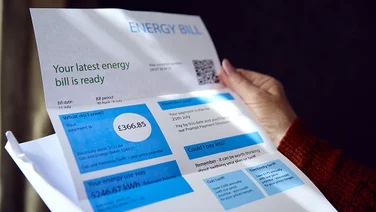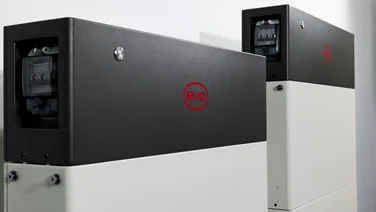69% of the UK would purchase a home with solar panels, according to our annual National Home Energy Survey.
With the ongoing energy and climate crises, this is huge news for bank balances and the health of our planet.
Our National Home Energy Survey, which surveyed 2,134 adults, suggests factors such as rising energy costs and the climate emergency are increasing the appeal of properties with solar panels.

How many Brits would buy a property with solar panels on the roof?

More than two thirds of Brits would now buy a property with solar panels on the roof, according to the latest data from our National Home Energy Survey.
That’s 69% of respondents saying they’d be either ‘likely’ or ‘very likely’ to purchase a home with rooftop solar — up from 65% in last year’s survey.
The percentage of people choosing ‘very likely’ has increased from 27% to 32% when compared to last year’s National Home Energy Survey — a jump that makes total sense, as the price of electricity has leapt up from 28p per kilowatt hour (kWh) to 34p per kWh as of March 2023.
This has led to a shortening break-even point for solar panels, making them even more attractive. Solar panels now take just 12.9 years on average to pay for themselves.
We can’t forget about climate-focused reasons, with the planet warming up faster than at any point in human history. The last 12 months have certainly brought the climate emergency into sharp focus, with record heat waves, droughts, and extreme weather events becoming increasingly common.
There is scepticism about the benefits of solar panels to the environment however, with 6% of respondents who believe we’re experiencing a climate emergency saying they wouldn’t buy a home with solar panels on the roof. A further 19% who believed we’re in a climate emergency were ‘neutral’ about buying or renting a home with solar panels.
Some people may not believe solar panels are the answer to the climate crisis, despite their obvious benefits in reducing carbon emissions and our reliance on fossil fuels. There’s also people who might not be willing or able to afford the upfront cost of solar panels.
Additionally, there are those who do believe there’s a climate emergency, but could be reluctant to install something they think is unaesthetic on their roof. Shockingly, you’ll still find some housing and landlord associations across the UK that won’t allow solar panels.

Why has this increased year on year?
The ongoing energy crisis over the last 12 months has likely had an impact on the amount of people wanting solar panels.
The crisis started when demand for energy shot up in the aftermath of the COVID-19 pandemic, causing big rises in the price of electricity and gas.
Russia’s war of aggression against Ukraine caused price hikes too, as the world looked to wean itself off of Russian gas. A lot of countries importing gas from Russia used it to generate electricity, which led to an increase in the cost of electricity.
Before the war in Ukraine, electricity cost 21p per kWh — it’s now 34p per kWh and would be 41p were it not for the UK government’s Energy Price Guarantee (EPG).
It’s these rising costs that have made solar panel benefits all the more appealing, because solar panels work very well to reduce energy bills and grid reliance.
With solar panels, you’ll save an average of 62% on your electricity bills, and you’ll break even on the typical £7,860 cost of a solar panel system in just 12.9 years.
So you can see why the number of people wanting homes with solar panels has increased, with energy bills continuing to rise. It’s likely why 48% of the people who said they’d buy or rent a home with solar panels also said they were concerned about energy bills.
Another key factor is the climate emergency, which as we’ve already noted has been in sharp focus for the past 12 months. Solar panels are excellent tools in reducing carbon emissions, and it makes sense that 60% of the people willing to buy/rent a home with rooftop solar said they were concerned about climate change.
How does this change with age?
The data shows a slight reduction in the likelihood to buy a property with solar panels as the generations get older, but regardless of age it’s greater than half, which is wonderful news.
It shows solar panels are popular even among the older generations, who are traditionally more reluctant to adopt solar panels and other green technologies.
The generational split is still interesting though, with a substantial 13% swing between Gen Z / Millennials, and the Silent Generation, who are clearly less keen to switch to clean electricity generated by solar.
Which UK regions are most interested in properties with solar panels?

Desire for properties with solar panels has varying levels of enthusiasm across the UK, with Wales the clear winners — 75% of people in Wales said they were ‘very likely’ or likely to buy/rent a home with a solar panel system.
This aligns with Wales’ higher awareness of green technologies in general. We also asked people in Wales about what low-carbon technologies they’d heard of, and 61% had heard of heat pumps, those eco-friendly boiler replacements that keep your home toasty without burning gas or oil.
Part of this awareness could be down to some of the government support on offer for green tech. For example, the Welsh government provides solar panel grants for homeowners who meet certain criteria, helping more people go green.
The region with the lowest desire to purchase or rent a home with solar panels was the East Midlands at 63%. This is still a strong majority though — just 37% of people from this region were ‘neutral’ or ‘unlikely’.
Why will some people not buy a property with solar panels?
There are various reasons people don’t want to buy or rent a property with solar panels.
Some people won’t buy a property with solar panels because of a misinformed idea that they reduce a property’s value, but we’ve found this isn’t the case. You’ll increase your home’s resale price by around 4.1% — this can mean tens of thousands of pounds for some properties.
It makes sense, because who wouldn’t want to buy a home with better energy efficiency than the average property, that can save you money on your energy bills every month?
Aesthetic reasons play a part — some believe solar panels make a house look ugly, but the visual appeal of solar panels has been improving constantly, just like the number of people adopting the technology.
You can get anything from sleek, black monocrystalline solar panels that look every part the stylish panels of the future. Or, you can choose solar roof tiles, which blend in seamlessly with existing roof tiles and still deliver clean electricity generated entirely from the sun.
Summary
Solar panels will only continue to increase in popularity, we’re sure of that. The increase from 65% to 69% in people that would buy a property with solar panels over last year’s National Home Energy Survey is proof.
Lowering your energy bills, shrinking carbon emissions, and reducing your grid reliance are why there’s never been a better time to switch to solar panels.






